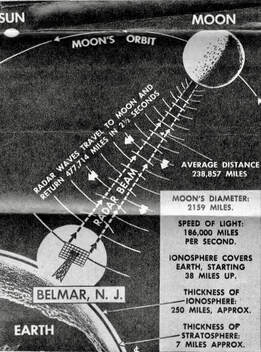The following passage is taken from an essay appearing in my 2021 book, To the Moon and Back: Essays on the Life and Times of Project Diana. My father, E. King Stodola, was Chief Scientist on Project Diana, and Jack DeWitt, mentioned below, was his boss. Most of the essay, which was written in celebration of an earlier anniversary, is devoted to the practical consequences of the successful moonbounce--military uses, scientific implications, advances in communication. In the last few lines I attempt to grapple with some of the more intangible effects of Project Diana on the American psyche:
 a contemporary explainer
a contemporary explainer Every country creates a mythology about itself that helps to form its national identity and make its people feel as though they are part of something larger than themselves. What aligns with the mythology is selected; what doesn't tends to be winnowed out. The postwar years were a time when America was starting to flex its muscles on a global scale, and its sense of itself was rapidly evolving to accommodate these developments. Project Diana was perfectly poised to be part of this process. For a variety of reasons, it is not so easy these days to feel exceptional on the global stage, which is probably why so many Americans harbor nostalgia for what in retrospect seem to them to have been simpler, better times.
 RSS Feed
RSS Feed